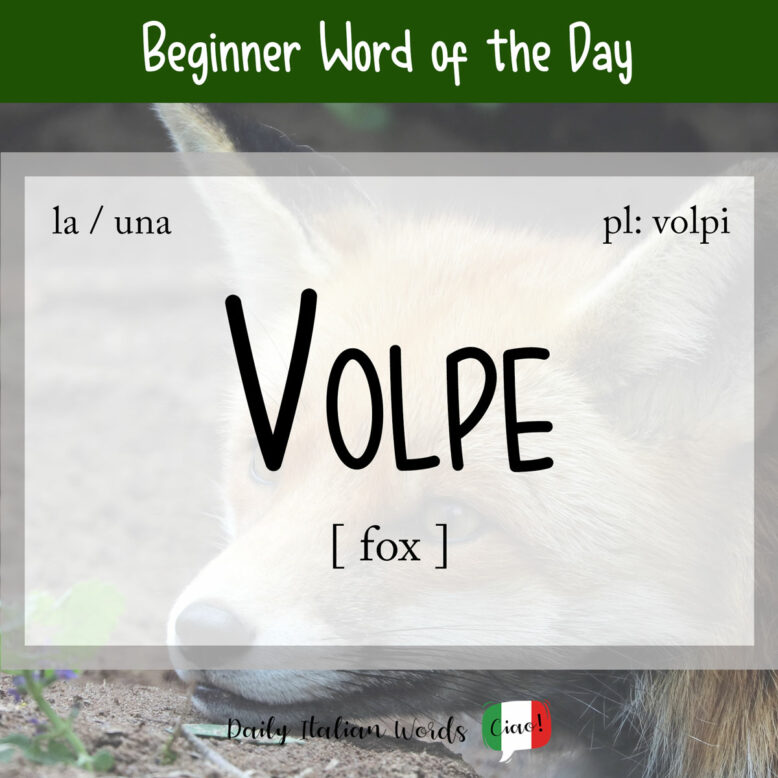The Italian word for fox is volpe (feminine, plural: volpi). It derives from the Latin word vulpes of the same meaning.

Two species of fox with which most people are familiar are the volpe rossa (red fox) and the volpe artica (arctic fox). In total, there are twelve separate extant species and four fossil species.
Some common terms associated with foxes include:
- caccia alla volpe = fox hunting
- cucciolo di volpe / volpacchiotto = fox cub
- tana di volpe = fox’s lair
I cuccioli di volpe stanno giocando fuori dalla tana.
The fox cubs are playing outside the lair.

Two other creatures that take the name volpe despite not being related are the volpe volante (flying fox) and pesce / squalo volpe (common thresher).
Because foxes are associated with slyness and astuteness in both Italian and English, they appear in a couple of comparative expressions: essere una vecchia volpe (to be a wily old fox) and essere furbo/a come una volpe (to be as sly as a fox).
The augmentative volpone (volpe + -one) is another term for a very sly person.

An interesting expression that plays with the idea of foxes being intelligent is mangiare pane e volpe which means to eat bread and fox. It was inspired by the traditional Italian breakfast pane e marmellata (bread and jam). Although the expression means to smarten up or to become astute, it is exclusively used in a sarcastic or ironic sense to imply the exact opposite. Take the following dialogue for example:
Ho rubato 300 euro e l’ho detto a tutti i miei amici. – Ma che cosa mangi la mattina? Pane e volpe?
I stole €300 and told all my friends. – What, are you stupid or something?
(Literally: I stole €300 and told all my friends. – What do you eat in the morning? Bread and fox?)
It can also be shortened to Pane e volpe!, an exclamation used to remark on someone doing something stupid.
Expressions related to ‘volpe’
Fare come la volpe con l’uva
Literal translation: To behave like the fox with the grape
English meaning: To scorn something you desire just because you know you can’t obtain it
Based on the expression:
La volpe che non arriva all’uva dice che è acerba / amara.
The fox that does not get the grape says it is unripe / sour.
Alternative:
La volpe che non arriva al lardo (lard) dice che è rancido (rancid).
Tu sei volpe e io tasso, tu sei furbo ma io ti passo
Literal translation: You are a fox and I a badger, you are smart but I will pass you
English meaning: Even those who consider themselves smart, will sooner or later meet someone who is smarter
Heather Broster is a graduate with honours in linguistics from the University of Western Ontario. She is an aspiring polyglot, proficient in English and Italian, as well as Japanese, Welsh, and French to varying degrees of fluency. Originally from Toronto, Heather has resided in various countries, notably Italy for a period of six years. Her primary focus lies in the fields of language acquisition, education, and bilingual instruction.


